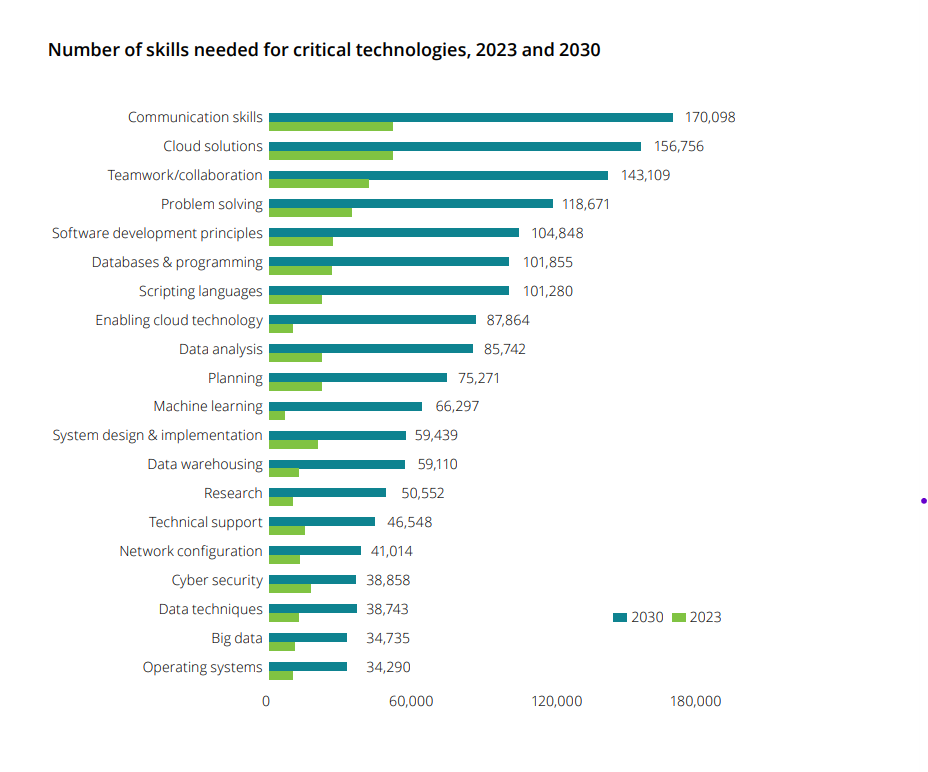The IT labour shortage in Australia is a pressing issue that has been steadily intensifying over recent years. This scarcity of skilled IT professionals hampers business growth and innovation, posing significant challenges for both the private sector and the economy at large. One proven solution that has emerged is outsourcing IT services to the Philippines. This approach not only addresses the immediate skill gap but also offers numerous strategic advantages.
The IT Labour Shortage in Australia.
Australia’s IT sector has been grappling with a labour shortage for several years. According to a report by Deloitte Access Economics and the Australian Computer Society, Australia needed an additional 100,000 technology workers by 2024 to meet the growing demand for digital skills. This shortage is driven by several factors, including the rapid pace of technological advancement, the increasing digitalization of businesses, and insufficient domestic training and education in STEM fields.

A 2022 report from the Australian Industry Group highlighted that 75% of businesses reported difficulty in recruiting skilled IT professionals. The COVID-19 pandemic exacerbated this problem, as the shift to remote work and digital services accelerated demand for IT expertise. Despite efforts to bolster the local workforce through training programs and immigration, the supply of skilled IT workers has not kept pace with demand.
Impact on Australian Small and Medium-Sized IT Organisations
While the IT labour shortage affects the entire industry, small and medium-sized enterprises (SMEs) are particularly vulnerable. Unlike larger corporations, SMEs often lack the resources and brand recognition to attract top talent. This puts them at a significant disadvantage in a competitive job market.
Challenges Faced by SMEs:
1. Resource Constraints: SMEs typically operate on tighter budgets and cannot afford to offer the high salaries and extensive benefits packages that larger companies can provide. This limits their ability to attract and retain skilled IT professionals.
2. Project Delays and Increased Costs: Without adequate staffing, SMEs face delays in project completion, which can lead to increased costs and lost business opportunities. This can be especially damaging in the fast-paced tech industry, where timely delivery is crucial.
3. Innovation Stagnation: The shortage of skilled IT workers can stifle innovation within SMEs. Limited access to talent means fewer opportunities to develop new products and services, potentially causing these businesses to fall behind their larger competitors.
4. Increased Workload on Existing Staff: To cope with the labour shortage, existing staff often must take on additional responsibilities. This can lead to burnout and decreased productivity, further exacerbating the problem.
What are the benefits of offshoring to the Philippines? Why is the Philippines becoming the outsourcing capital of the world?
Outsourcing IT services to the Philippines has emerged as a strategic solution to mitigate the IT labour shortage in Australia. The Philippines offers a rich pool of skilled IT professionals, cost-effective services, and a favourable business environment.
Skilled Workforce
The Philippines boasts a highly skilled and educated workforce, particularly in the IT and business process outsourcing (BPO) sectors. According to the Philippine Statistics Authority, there were over 2.3 million graduates in STEM fields from 2019 to 2022. Additionally, the country’s strong emphasis on English proficiency makes Filipino professionals highly competitive in the global market.
Cost-Effectiveness
One of the most compelling advantages of outsourcing to the Philippines is cost-effectiveness. Labour costs in the Philippines are around 70% lower than in Australia. A study by PayScale in 2023 indicated that the average salary for a software developer in the Philippines was approximately AUD 20,000 per year, compared to AUD 80,000 in Australia. This cost differential allows Australian companies to access high-quality offshore IT services at a fraction of the cost of hiring locally.
Why the Philippines is the ICT hub of Asia?
The Philippines has developed a robust BPO infrastructure supported by government initiatives and policies that encourage foreign investment. The IT and Business Process Association of the Philippines (IBPAP) reported that the BPO industry contributed over USD 29 billion to the Philippine economy in 2022, with IT services being a significant component. This well-established industry provides a reliable and mature IT outsourcing destination for Australian companies.
What Yempo’s clients say about adding offshore IT talent to their teams?
“Yempo provides us with a very stable workforce that’s far cheaper to hire than locally. Our Yempo-provided team has a very low attrition rate, a key standout for Prezzee.” – Ron Matteazzi, Global Head of Operations, Prezzee
“If you want an offshore team then Yempo will help you to hire, find great candidates, run all HR and provide easy systems – all in a friendly manner. With Yempo, everything is under control.” –Shareef Hamimy, Regional Engineering Manager, Aluma
“We carried out seven interviews and were able to hire five people. They are some of the most amazing staff we’ve got. Yempo has an affinity for the tech space and quickly understands our needs.” – Aran Flanagan, Chief Technology Officer, Prezzee
.
Summary
The IT labour shortage in Australia is a complex issue that requires multifaceted solutions. Outsourcing to the Philippines presents a viable and strategic option to bridge the skills gap. With its skilled workforce, cost advantages, and supportive business environment, the Philippines stands out as a prime destination for Australian companies seeking to augment their IT capabilities.
By embracing IT outsourcing with a trusted IT outsourcing specialist partner like Yempo, Australian businesses can not only overcome the immediate labour shortage but also position themselves for long-term growth and innovation in the digital age. As the global economy becomes increasingly interconnected, leveraging international talent pools will be essential for sustaining competitive advantage and driving economic progress.
How Yempo Overcomes IT Outsourcing Challenges?
While outsourcing to the Philippines offers numerous benefits, it is not without challenges. Managing cross-cultural teams, ensuring data security, and maintaining service quality are critical considerations. Ten years ago, Yempo’s founders realised that small and medium-sized businesses were being let down by the offshore sector. Sector inexperienced owners (often with a background in running contact centres), poor staff selection, high staff turnover rates and hidden costs left clients wondering if the wrong choice was shifting IT offshore.

Michelle and Ian had long, successful careers in the IT and finance sectors prior to setting up Yempo. Over 15 years ago, while employed at a global investment bank, they were stationed in different locations: Ian in Philadelphia and Michelle in Manila.
In Manila, Michelle established a substantial offshore engineering team, which Ian and his team later utilized. Years later, at the end of their careers with the bank, they realized their profound understanding of offshore outsourcing and their ability to leverage offshore accounting and IT talent effectively for small businesses.
Yempo was born with the mission to provide high-calibre, loyal talent for IT clients using a simple, supportive, and transparent operating model.
Thank you for visiting our blog! We hope you found our content informative and engaging. Stay connected with us for more insightful blogs, updates, and tips on outsourcing IT in the Philippines, or shoot us an email at [email protected]. We are happy to answer your questions!
Learn more
Find & cost the IT talent you need
Explore your aims with CEO Michelle Fiegehen

